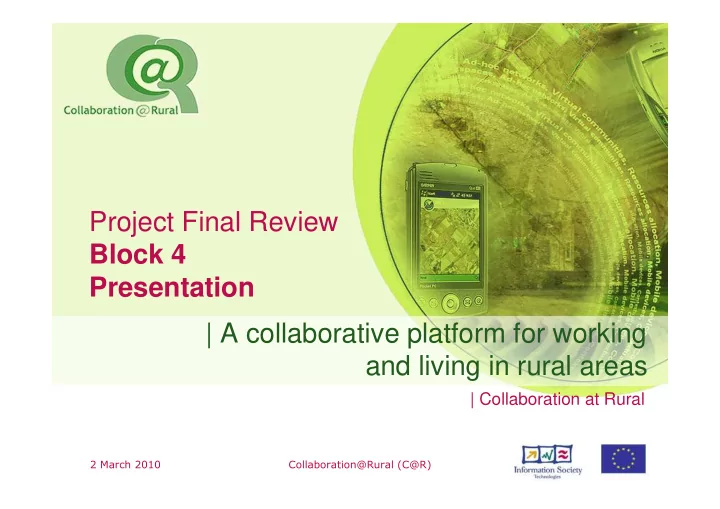

Project Final Review Block 4 Presentation | A collaborative platform for working and living in rural areas | Collaboration at Rural ������������ �������������������������
C@R – B4 Presentation Summary Agenda • Dissemination approach and results • Policy recommendations & PST • Exploitation • C@R Impact � �������������������������
Dissemination Approach and Results • Press Releases & Radio/TV interviews • Leaflet, Newsletter, Posters, Videos • Articles and Presentations (see impact) • Conferences and Workshops (last period) • Cudillero • Brazil • Brussels • The Book and the Special issue on eJOV • major achievement as regards scientific dissemination • Web site www.c-rural.eu & Deliverables download � �������������������������
Press Releases, Radio & TV Interviews Cordis.europa.eu � �������������������������
Videos • At least one video for each of the Living Labs (4 of them are available on the C@R web site) � �������������������������
Workshop: Towards the Rural Innovation Followed by a visit to the Cudillero Living Lab at the fisher’s guild � �������������������������
Conference in Brazil • C@R specific workshop • “ICT in European Rural Living Labs” ����������������������������������������������������������������������������������� ��������������� �!�����������������"������#����$��%�� � �������&�����'!������(���)�*� � "�������������+����, ������������������������������������"����������������� � ������������ � .����6���� �������&�-.��'�� �-�������������%����/�0�1� �2�)��������������*� ���������� � � "�����2������2�+���������������������3�����4"�'�����+�����������"����*����/���� �������&��".(�.� � �����5��������������#����������������"����� �������&�����'�������"����*� � � �������������������������
Conference in Brussels • Wednesday 3rd March 2010 • From 9:00 to 13:20 • Venue • Hotel Silken Berlaymont Brussels 11-19 Boulevard Charlemagne • Speakers • Joze Gricar , Maribor University • Carolina Rubio, Innobasque • Jesse Marsh, Living Lab TLL-Sicily • Bertrand Wert, DG Enterprise and Industry EC • Kypros Kyprianou, DG Regional Policy EC • Eduardo Crespo de Nogueira y Greer. Technical Adviser, Spanish rural network. DG Sustainable Development of the Rural Areas • Per Blixt, Head of Unit. DG INFSO. New Infrastructure Paradigms and Experimental Facilities � �������������������������
eJOV Special Issue www.ejov.org. � �������������������������
The BOOK! • A major project outcome • Foreword by Per Blixt • It presents main results • Lessons Learnt • It officially represents the • Publishable Report for EC �� �������������������������
Deliverables Download Strategy • Dissemination of C@R results • Public deliverables free to download • Track of who downloads • Minimum info request in order not to discourage interested people �� �������������������������
Policy Recommendations Francisco Perez Trejo • Policy implementation process • Contribution of Living Labs • Innovation policies • Sustainability and scaling-up • Recommendations to policy makers • Methodological approach • Recommendations framework • Strategic approach for contributing to Rural Development �� �������������������������
The Impact of Living Labs • Linking research results to sustainable development • Link to rural development and innovation policy process • Social networks - scaling-up mechanisms �� �������������������������
Contributions to scaling-up C@R RLL • Using the FAO Rural Development Initiative and the network of decentralized offices to support the international Living Labs initiative • C@R can provide the direct link to the international policy process though partners like FAO • National and regional projects (Syria, Haiti reconstruction) • NEPAD • Ibero-American Summit (11 November 2010) �� �������������������������
Policy Support Tool Javier Garcia Guzmán �� �������������������������
Needs Covered • The C@R PST is intended to cover two types of functionalities: • To support the policy and strategy management at Living Lab level • Environmental Scanning • Policy/Strategy Formulation • Follow up of strategy implementation • Dissemination of current state • To evaluate how Living Labs are contributing to implement specific policies, such as innovation or rural development • http://www.c-rural.net �� �������������������������
Main Components • Information Model • Questionnaire-based approach • Questionnaire Preparation • Filling-up questionnaire • Answers integration • Internal information upgrade • Information analysis and presentation • Based on mental maps approach • Information maps able to be modified for better idea presentation and web-based visualization �� �������������������������
PST Validation • Validation activities • The first validation activity was performed by C@R staff, guided by PST staff by means of demonstration. • The second validation activity was performed by partners of Mediterranean Living Labs (MEDLAB) project in two times, each of them performing a demonstration of the C@R PST capabilities and interviews to gather the experts feedback. �� �������������������������
Validation Findings -1 • Main conclusions obtained from the evaluation • The structure of the information model was considered appropriate • The internal C@R experts considered the questionnaire-based approach a good strategy to gather the information on results and added value that is required for the analysis of contribution of Living Labs to the implementation of innovation and rural development policies. • The analysis of the implementation and impact of a specific policy based on mind maps was well appreciated. �� �������������������������
Validation Findings -2 • Main conclusions obtained from the evaluation • The tool in its current appearance is useful only for Living Lab managers and policy makers to define and evaluate policies and strategies. • Initial training is required to use efficiently the tool, because the process to prepare and manage the questionnaires was not considered as easy to learn. • The information obtained is relevant for Living Lab managers and policy makers involved actively in the Living Lab but difficult to interpret for external stakeholders. �� �������������������������
Evolution • Enhance the public policies definition based on the Living Lab activity and results. • The identification of recommendation to policy makers by means of collaborative scenario building; • Specific tools for implementing in a collaborative way the processes for policy definition, control and evaluation. • Enhance the participative orientation to define, control and evaluate policies adapting social software tools. • Enhance the gathering of external information from the LL community to enable information retrieval mechanisms. • Include information of the instruments implementing the public policies related to Living Labs. • Creation of networks of interested partners in several technological areas considered in Living Labs. �� �������������������������
Recommend
More recommend